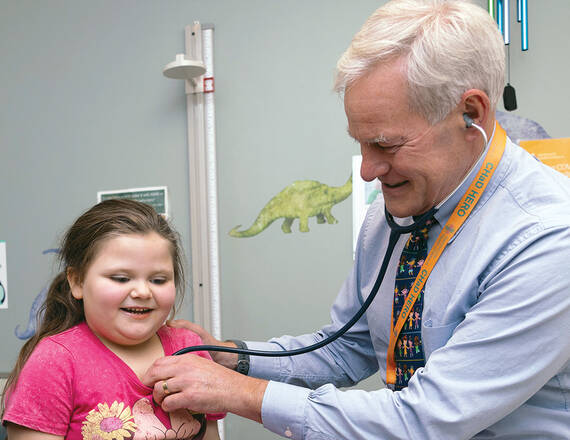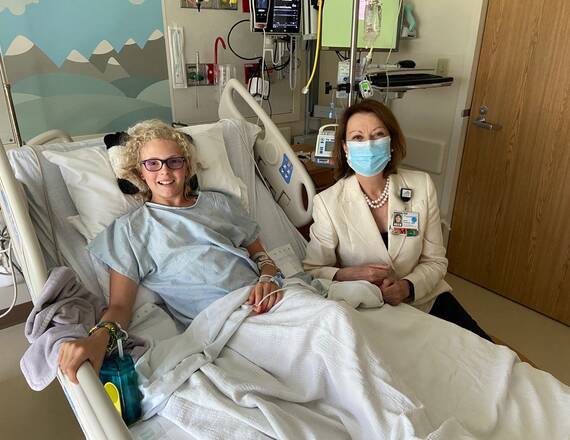Advocating for Child Health
Dartmouth Health Children’s Leads Regional Partnership to Advocate for Kids’ Complete Well-being
Dartmouth Health Children’s pediatric residents began to note that their patients have tooth decay, and though not dentists, these physicians-in-training are primed to care for the whole patient. Using the advocacy skills they learned in the Dartmouth Health Children’s Community Pediatrics curriculum, they discovered that parents sometimes struggled to access a dentist to manage their child’s oral health.

Late last year, several of those residents devised an oral health pilot project to fill the gap when a dentist wasn’t readily available. A limited rollout of the project has begun at Dartmouth Hitchcock Medical Center (DHMC), in which residents and other trained providers use silver diamine fluoride to stop dental cavities from progressing. The residents emphasize that they aren’t replacing dentists, but instead they are helping to temporarily mitigate the shortage of dental providers in the region.
“Silver diamine fluoride is a stopgap; we’re treating [cavities] to buy time for children who don’t have a dentist or are on a waiting list to see a dentist,” says Jane Higley, DO, a second-year pediatrics resident at DHMC. “Some families are focused on social needs, such as their living situation and food insecurity, and these parents might prioritize doctor visits over dental visits. So we incorporate a basic oral health assessment into our standard physical exam for well-child checks.”
The oral health project is one of many advocacy projects developed by Dartmouth Health Children’s residents and highlighted through the Northern New England Advocacy Collaborative (NNEAC), a partnership among pediatric residency programs in New Hampshire, Vermont, and Maine, and the states’ chapters of the American Academy of Pediatrics. Through NNEAC, residency programs in all three states share knowledge and ideas from their programs’ advocacy curricula.
Dartmouth Health Children’s residents presented this project and others in September at NNEAC’s seventh annual summit, where attendees share successes and strategies to improve the lives of children in the region—helping to address the social, economic, and safety issues that accompany comprehensive pediatric health. This year, Dartmouth Health Children’s residents also presented about school mental health integration, child passenger safety, transgender-affirming care, reducing gun violence, and other topics.
“As pediatricians, we see the human face of social systems that don’t work very well, such as housing insecurity, food insecurity, and transportation problems. Advocacy is the avenue to address those issues outside the healthcare system,” says Dartmouth Health Children’s pediatrician Steve Chapman, MD, medical director of NNEAC and the Boyle Community Pediatrics Program, and assistant professor of pediatrics at the Geisel School of Medicine at Dartmouth. “We’re speaking alongside those whose voices aren’t heard to help create systemic change.”
Training Lifelong Child Health Advocates
NNEAC facilitates collaboration among pediatric departments from hospital systems across the region as they develop and share curricula that are culturally sensitive and community-specific to northern New England, support community projects and legislative advocacy, engage community partners, promote mentorship among faculty and residents to foster advocacy skills, and train pediatricians to become lifelong child-health advocates.
For example, “Our gun lock project involves providing free cable locks to families in our outpatient pediatrics clinics at DHMC and Heater Road, our psychiatry clinic, and the emergency department,” says Ariel Hartman, MD, a second-year pediatrics resident at DHMC. Hartman notes that efforts go beyond providing prevention tools like this. Through education efforts involving programs such as CALM (Counseling on Access to Lethal Means), she is working to engage other pediatricians in learning to counsel families about gun safety.
“Firearm-related violence is a major public health issue affecting our children,” Hartman says. “I hope I can provide residents with education and encouragement to talk about this issue with families and how they can best protect children from firearm-related harm.”
The Dartmouth Health Children’s pediatric residency program also trains learners on legislative advocacy skills so they will be prepared to write opinion pieces or testify before state legislators on ideas to improve the lives of children and families. For example, physicians can screen patients for food insecurity, but Chapman notes: “Wouldn’t it be great to also have a school lunch program or a summer program that provides resources through schools for healthy meals?”
Pediatricians can advocate for such programs at the state level—and Dartmouth Health Children’s prepares its residents to do that successfully.
The Dartmouth Health Children’s pediatric residency curriculum includes an annual mock testimony session, attended by several New Hampshire legislators who help residents review the legislative agenda and identify key issues that affect children. The residents practice giving testimony, and they receive guidance on how to effectively share their clinical observations with legislators.
“I went with residents to the statehouse and met with a lobbyist group, and we talked through bills relevant to us and they coached us on how to advocate,” says KC Kelly, MD, a second-year pediatrics resident at DHMC who is also part of the oral health project. “We set up meetings with two state senators and two state representatives to discuss our thoughts on bills we wanted them to advocate for or vote against. We also met New Hampshire Gov. Sununu.”
Strong Pediatricians, Stronger Patients
Advocacy work is beneficial for both children and physicians, Chapman says. “Residents come in with such passion and energy to create a better world for kids and families, and advocacy is some of the best burnout prevention there is,” he says. “It can make you angry to see kids struggling with something that’s preventable, and that causes burnout. But working with others to advocate for these families is energizing.”
“It’s easy to get excited about advocating for kids because you’re helping people without a voice of their own,” Higley says. “I think advocacy is crucial to being a pediatrician. Our program does a great job of allowing us to develop and practice those skills.”
Advocacy education at Dartmouth Health Children’s is made possible by funding from the Boyle Community Pediatrics Program, which was established 25 years ago through donations spearheaded by Jane and Bill Stetson. The Stetsons and William Boyle Jr., MD, emeritus professor of pediatrics, created the Boyle program to help address family and community issues that affect children’s well-being.
“NNEAC is possible because of philanthropy,” Chapman says, noting that a donation from Selma Bornstein—the wife of the late Murray Bornstein, a Dartmouth College alumnus and former DH neuroscientist—funds a large portion of NNEAC summits. NNEAC also received support from Suzanne Boulter, MED ’66, and Philip Boulter, MED ’64, both Dartmouth Medical School alumni. “It’s only through philanthropic support that we can create these opportunities and connections to open up that advocacy space and address equity problems.”
To learn more about the Northern New England Advocacy Collaborative or pediatric care at Dartmouth Health Children’s, contact Polly Antol at 603-646-5316 or Polly.Antol@hitchcock.org.


